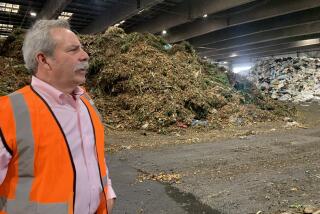Recycled Electronics Pose a Health Hazard in Asia
- Share via
High-tech garbage dropped off at U.S. recycling centers--including ancient PCs, cell phones and MP3 players--is causing an environmental and health crisis in Asia, according to a report released Monday by several environmental organizations.
The report, “Exporting Harm: The High-Tech Trashing of Asia,” found that up to 80% of all electronics waste collected for recycling in America is purchased by brokers, which export the equipment to China, India, Pakistan and other developing countries. Once there, thousands of laborers--including children--burn, smash and tear apart electronic waste to scavenge for precious metals.
For the record:
12:00 a.m. March 3, 2002 FOR THE RECORD
Los Angeles Times Sunday March 3, 2002 Home Edition Main News Part A Page 2 A2 Desk 1 inches; 28 words Type of Material: Correction
High-tech garbage--A Tuesday story in Business on the dumping of high-tech waste in Asia should have credited Associated Press for a passage describing laborers scavenging for precious metals.
In the process, they have unwittingly exposed themselves and their surroundings to toxic hazards, including lead poisoning, chemical blindness, pulmonary edema and cancer, according to the report.
“It’s the dirty little secret of the ‘clean’ high-tech industry,” said Jim Puckett, coordinator of Seattle-based Basel Action Network, one of the environmental groups that toured China in December and worked on the report. “Most people have no idea how common this is.”
Such equipment comes from all over the U.S. Those discarding their old electronics include students buying a new digital camera, families upgrading their phones and even the Los Angeles Unified School District overhauling its classroom computers.
In Guiyu, China, villagers make ends meet by burning electronic wires to draw out traces of copper. The report details how the workers, including scores of children, doused circuit boards in acid baths to remove precious metals from the discarded parts.
Photographs taken by the report’s authors show the villagers working on machines with identifying tags from the LAUSD and the city of Los Angeles. The city’s Bureau of Sanitation regularly holds electronic and computer recycling events.
“I’m incredibly surprised. It never even crossed our minds,” said Jim Konantz, LAUSD assistant superintendent for instructional technology. “We don’t know what happens to the machines after they leave us.”
The school district regularly auctions off its older tech gear to the public, Konantz said.
Often, computer parts wholesalers such as Port Chain Industries of Riverside buy the equipment at auction and resell it to recycling brokers in bulk. The firm has been the biggest buyer in the last two school district auctions.
“People buy from us and ship overseas,” said Lily Chen, a Port Chain employee.
“I don’t know where they go,” Chen said. “They go away.”
The demand for ever smarter and more powerful technology has cut the life span of a consumer electronic device from five years to 18 months, the report says.
A 1999 study conducted by Stanford Resources Inc. for the National Safety Council projected that in 2001, more than 41 million personal computers would become obsolete in the U.S.
Analysts estimate that in California more than 6,000 computers become obsolete every day.
Each device is filled with potential hazards, the study’s researchers say.
One of the main dangers comes from cathode ray tubes, the technical name for the glowing screens used in computer monitors and televisions.
The average 14-inch monitor uses a tube that contains an estimated 5 to 8 pounds of lead. The lead can seep into the ground water in landfills or, if the tube is crushed and burned, float into the air.
In addition, cadmium is found in semiconductor chips, chromium in a PC’s steel exterior and brominated flame retardants in the circuit boards. All the materials are considered toxic.
Given these hazards, the Environmental Protection Agency bans businesses from discarding computers in the trash.
In California, it is against the law to dump computer monitors into landfills.
Broken monitors are considered hazardous waste, according to the state Department of Toxic Substances Control.
Some PC makers, such as IBM Corp. and Hewlett-Packard Co., have launched recycling programs that charge consumers $30 or more for the service.
More to Read
Inside the business of entertainment
The Wide Shot brings you news, analysis and insights on everything from streaming wars to production — and what it all means for the future.
You may occasionally receive promotional content from the Los Angeles Times.










